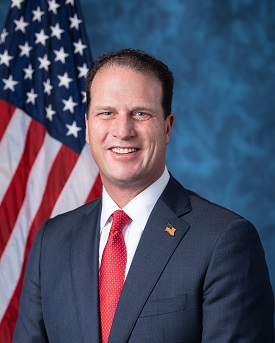Pfluger Works to Protect Farmers from Harmful Biden Administration Climate Proposal
 On National Farmer’s Day, I sent a letter to U.S. Securities and Exchange Commission (SEC) Chairman Gary Gensler expressing concern over the SEC’s proposed climate disclosure rule, which will harm U.S. agriculture producers and the economy.
On National Farmer’s Day, I sent a letter to U.S. Securities and Exchange Commission (SEC) Chairman Gary Gensler expressing concern over the SEC’s proposed climate disclosure rule, which will harm U.S. agriculture producers and the economy.
In the letter, I note: “The immense task of monitoring and reporting emissions data will fall to those who lack the financial resources and sophisticated technology to document required disclosure information. The cost of this effort will increase production costs at a time of record inflation and inhibit American producers' ability to compete in the global market and encourage further consolidation across supply chains. The SEC' s climate disclosure rule will prove to be disastrous for the agriculture industry and our nation's food security … A nation that can feed itself is inherently safer and more secure than one that cannot. This rule unduly burdens rural communities and threatens both our economic and national security.”
I also emphasized the significance of the agriculture industry, which contributes over $100 billion in value to the U.S. GDP, and asks how the SEC will insulate agribusinesses of all sizes from the immeasurable negative impacts of the proposed rule.
Read the full letter here or below:
Dear Chair Gensler,
I write to express serious concern regarding the Securities and Exchange Commission’s (SEC) proposed climate disclosure rule. This proposed rule extends the authority of the SEC and will cause harm to the U.S. economy at a time of fiscal uncertainty.
The unprecedented Scope 3 emissions requirement mandates that companies disclose the indirect emissions from upstream and downstream activities, and the materiality standard applied to these emissions is so sweeping that all sectors of the U.S. economy will be impacted, specifically in the agriculture industry. Since this standard requires reporting of all supply chain emissions, public companies will be required to report data from businesses of all sizes, including agribusinesses. There is no question that the complexity of the proposed rule will emanate throughout a company’s entire value chain, burdening all agriculture producers.
In your testimony, you claimed that the proposed rule is not targeted at farmers and agribusinesses. Yet to do business with larger companies, small farms will be required to disclose emissions despite not being publicly traded themselves. The immense task of monitoring and reporting emissions data will fall to those who lack the financial resources and sophisticated technology to document required disclosure information. The cost of this effort will increase production costs at a time of record inflation and inhibit American producers’ ability to compete in the global market and encourage further consolidation across supply chains.
The SEC’s climate disclosure rule will prove to be disastrous for the agriculture industry and our nation’s food security. Due to the significance of this proposal, I request a response to the following questions by November 1, 2022:
- Currently, farming contributes over $100 billion in value to the U.S. gross domestic product. What steps will the SEC take to provide insulation to agribusinesses, of all sizes, from the impacts of the proposed climate disclosure rule?
- How will the SEC prioritize the continued investment in the energy, agriculture, and other industries with significant national security interests?
- How does the proposed climate disclosure rule align with the long-standing mission of the SEC to protect investors, maintain fair, orderly, and efficient markets, and facilitate capital formation?
- Recently, the Supreme Court invoked the Major Questions Doctrine in West Virginia v. EPA.[1] The Major Questions Doctrine states that in “extraordinary” cases, where the “history and breadth of the agency authority that has been asserted” and the “political and economic significant” provide reason to hesitate before assuming that Congress has delegated such authority. In such circumstances, the Agency must point to “clear congressional authorization for the authority it claims.” The SEC’s proposed climate disclosure rule would expand the scope of its authority in a way that is almost indistinguishable from the EPA’s failed attempt to seize more than Congress has delegated. How will the SEC comply with this verdict as the proposed climate disclosure rule continues to be developed?
A nation that can feed itself is inherently safer and more secure than one that cannot. This rule unduly burdens rural communities and threatens both our economic and national security. As the agency considers all public feedback regarding the proposed rule, it is critical the SEC acts within its statutory authority and focuses on the long-term interests of Main Street investors. I look forward to your response.
Sincerely,
August Pfluger
Member of Congress




